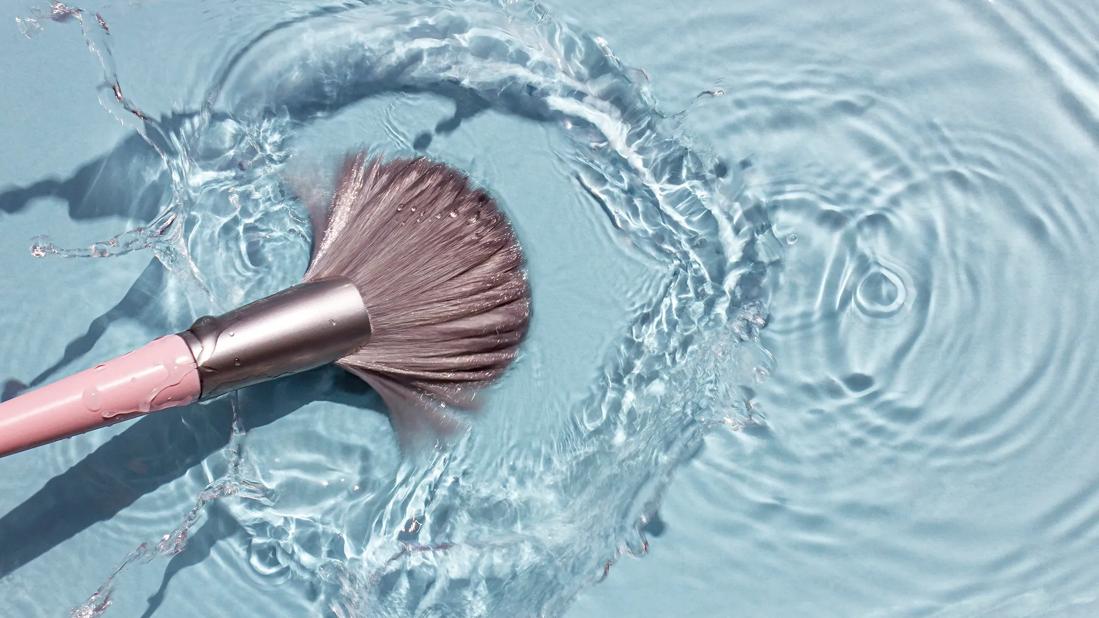Some gentle soap and warm water go a long way when you’re washing these cosmetic tools regularly

Image content: This image is available to view online.
View image online (https://assets.clevelandclinic.org/transform/5d3952e1-5e4c-4ac0-9887-379a267fd410/clean-makeup-brush-1411288814)
Rinsing clean makeup brush in water
Washing your face is usually the first step of any skin care routine. It helps remove dirt, grime and leftover makeup.
Advertisement
Cleveland Clinic is a non-profit academic medical center. Advertising on our site helps support our mission. We do not endorse non-Cleveland Clinic products or services. Policy
But washing your makeup brushes should also be at the top of your to-do list, especially if you’re breaking out.
Dermatologist Melissa Piliang, MD, explains how to clean your makeup brushes and how often you should wash them.
Using an unwashed brush can cause:
Why? Because every time you touch an unwashed brush to your face, you’re not just applying new makeup. You’re also applying old makeup and whatever dirt and oil the brush picked up since the last time you used it.
“Most makeup products are formulated with preservatives to keep bacteria and yeast from growing,” explains Dr. Piliang. “But if you let the makeup build up over time and it sits there for months, you could develop a bacterial infection if you had a cut in your skin that allows bacteria to enter.”
It’s not just about old makeup either. If you store your brushes in a cup on your bathroom counter or out in the open where you get ready, they can also pick up dust, sneezes and other bacteria floating around in the air.
“Keeping your makeup tools clean can go a long way toward keeping harmful bacteria from getting on your face,” she continues. “If you develop a very red eye, eye drainage or any eye pain after applying makeup, it’s time to call your doctor.”
Advertisement
To clean them, you’ll need:
Dr. Piliang recommends these steps:
Different brushes have different recommended cleaning schedules:
“Your eyes are more prone to infection, so makeup brushes you use in that area should be washed regularly,” states Dr. Piliang.
If you use sponges to apply liquid makeup, pay special attention to keeping them clean, too. Sponges absorb makeup, and the moisture can potentially lead to bacteria and yeast overgrowth.
And finally, when your makeup brush becomes frayed or worn, or when a brush loses its shape, it’s time to replace it with a new one.
“Keeping your makeup brushes and other tools clean and intact is an important step in keeping your skin healthy,” says Dr. Piliang.
Advertisement

Sign up for our Health Essentials emails for expert guidance on nutrition, fitness, sleep, skin care and more.
Learn more about our editorial process.
Advertisement
Although it could be used as a moisturizer, this new trend is not recommended
It’s a great disinfectant for around your home, but not for your skin
Changes in texture, smell, color and performance are signs it’s time to throw the cosmetic item away
Strengthening your skin barrier, simple routines and minimizing products are ongoing, popular trends
Moisturizing, running a humidifier and adjusting your showers may help keep itchiness and irritation at bay
Glycolic acid benefits skin tone, texture and pigmentation by exfoliating dead skin
New formulas are less drying and contain water-based and skin-loving ingredients
At a minimum, in the morning, apply a cleanser, followed by a moisturizer and sunscreen, in that order
Although it could be used as a moisturizer, this new trend is not recommended
Communicating clear limits helps protect your time, energy and emotional well-being
High cholesterol can be genetic, but testing and treatment can lower your heart disease risk